East Africa through Western eyes: startups & entrepreneurship

Every country has its own entrepreneurial spirit. While many trends and best practices such as the Lean Startup model are considered as common knowledge, their execution varies between countries, cultures and environments.
The Kenyan entrepreneurial culture is surprisingly different on one side and surprisingly common on the other side, compared with the European entrepreneurial culture. In general, Kenya can be considered as the furtherst developed market among East African countries.
East Africans are hustlers
While the common understanding of Western startup culture is to focus on one thing and one thing only, the East African way of doing business and approaching entrepreneurship is to run multiple side hustles.
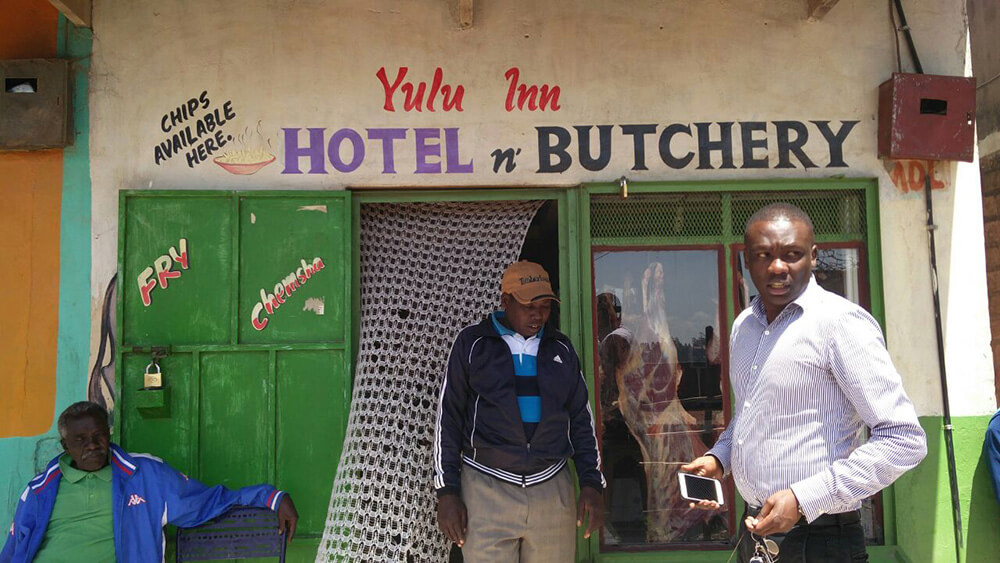
Side hustles are very common in Kenya's society and are considered as the way of working your way up in society. Whenever a Kenyan spots an opportunity, s/he jumps right in. So it happens that people with nine-to-five jobs have a restaurant, bar or garage running as their side business(es).
I personally think that having a mindset of constantly identifying opportunities and market niches is beneficial for entrepreneurs, but it's tempting on the other hand to loose focus or persistance with a particular business if times get hard.
Expat & local founders are teaming up in Kenya
To get the best of these two worlds, founders often team up. I learned that many successful startups in East Africa consist of two founders with different nationalities and backgrounds.
Especially those founding teams with an international network beyond East Africa are seen to be more successful in the long run, because apart from their network, they usually bring previous experience to their new venture as well.
Speaking of experience, some founders I talked to told me that it's hard to find the right talent in Kenya, especially when it comes to digital businesses like Software-as-a-Service (SaaS) companies. In fact, most founders gained their inital experience by reading, executing and (sometimes) failing along the way.
The situation is getting better and has already become better over the past several years due to increased ambitions from international tech companies to start local developer gatherings such as Facebook with its Developer Cirlce program or Google with Developer Groups.

Schools and universities mostly lack IT specific programs and courses, therefore many developers are looking for alternatives such as online courses, YouTube tutorials and companies like Andela who are sourcing local talent and teaching them modern software development skills.
The strongest industries are about solving fundamental problems
In East Africa, the most popular industries local companies are active in, are primarily fintech, logistics, agriculture, education and eCommerce.
Sam Floy from Great Britain who moved to Kenya a few years ago to help businesses get familiar with the East African market, puts it this way:
The problems local entrepreneurs are working on need to be fundamental for two reasons. First, there is often no reliable, basic infrastructure in many segments which needs to be built first. Secondly, the market size and purchasing power are both limited if you look at the Kenyan market only. The more substantial the problem is, the more people will be affected by its solution.
In order to make the economics work, the problems to be solved need to be fundamental. For better illustration, let's have a look at three successful companies based in Kenya.
Twiga Foods
Having just recently raised more than $10m in a Series A round, Twiga Foods is working on radically improving the supply chain among various stakeholders, eventually cutting out middlemen and bringing more transparency into the process. To date, Twiga Foods primarily focuses on selling bananas 🍌
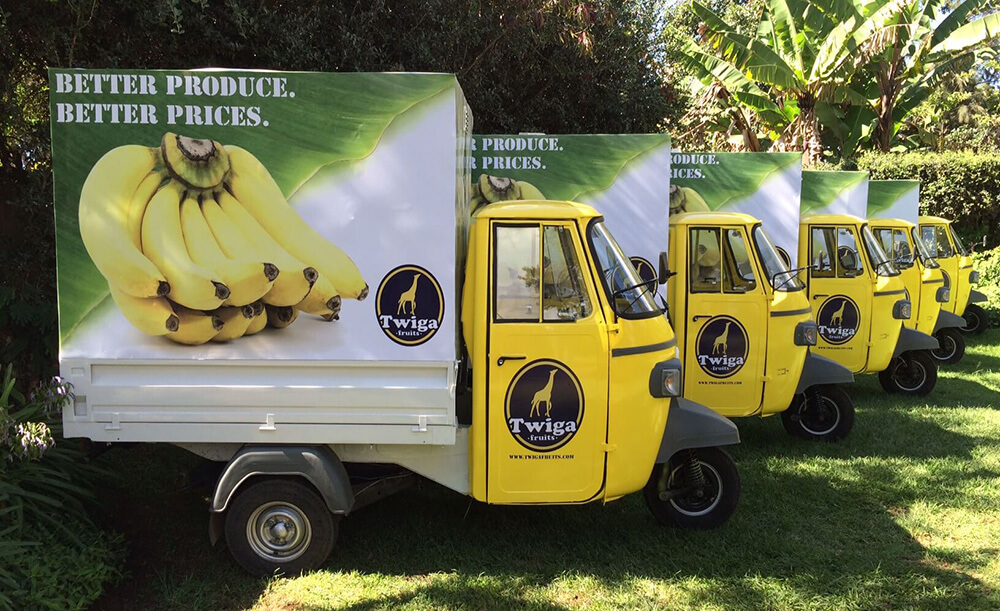
The startup’s platform (...) translates this aggregated purchasing power to farmers across the country, allowing them to access stable markets at better prices, while minimising post-harvest losses through efficient logistics. It is the largest distributor of a number of basic food staples in Kenya, having sold over 55 million bananas and delivering over 4,000 orders a week.
Source: http://disrupt-africa.com/2017/07/kenyas-twiga-foods-raises-10-3m-series-a-funding-round/
Lori Systems
I first heard about Lori Systems when I was following the live stream of TechCrunch Startup Battlefield Africa where they won the Best of Show award among other awards.
Lori's goal is to radically improve the efficiency of truck logistics by minimizing waiting time and empty trips.

The company also handles invoicing, payment and tracking. It’s an all-in-one platform that leverages technology to elegantly solve logistics issues that have been around for a while.
Source: https://techcrunch.com/2017/10/11/lori-systems-wins-best-of-show-at-startup-battlefield-africa/
BuuPass
At Nairobi Garage I met Sonia Kabra, one of the three international founders on BuuPass. The young company's simple goal is to enable online bookings of bus trips across Kenya, their first market.
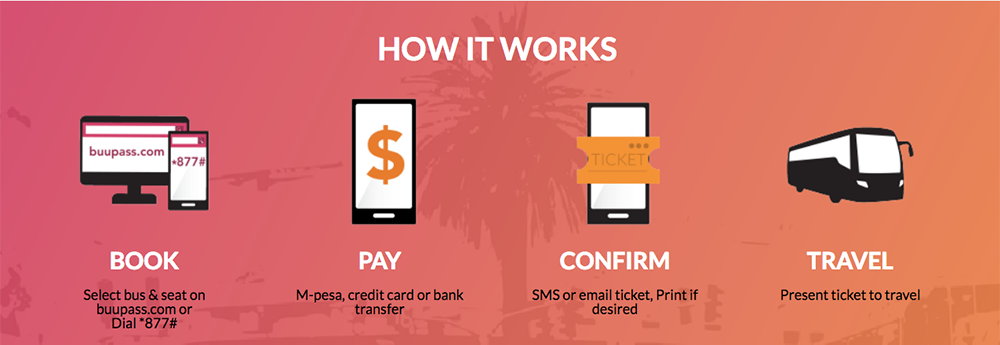
Currently, travellers are required to line up in person to check if there are still seats available and at what price. BuuPass also helped implementing their functionality via USSD codes – comparable with a very simple app installed on a phone's SIM card – with Safaricom.
Early stage investments are rising
Local startups have a hard time attracting money from local investors who are traditionally more interested in brick & mortar and real estate investments.
However, international investors as well as initiatives to boost local investments are incresingly filling this gap. Stephen Gugu from Viktoria Ventures is part of the African Business Angel Network (ABAN) and says the situation is getting better for founders:
When we are looking for founders to invest in, we are looking for these specific traits:
- Patience and endurance
- A Pan-African view
- Industry experience
- A team of two, a local and an international co-founder
Such teams can and will get money to work on their idea. In East Africa, I can see an rising interest in digital solutions to everyday problems.
The World Bank issues regularly reports on the current state of Doing Business for countries worldwide. Below are for comparison the reports from Kenya, Nigeria and South Africa.
What surprised me the most was that Kenya is ahead in important categories compared to South Africa and Nigeria.
(⬆ is better)
Doing Business: Kenya 🇰🇪
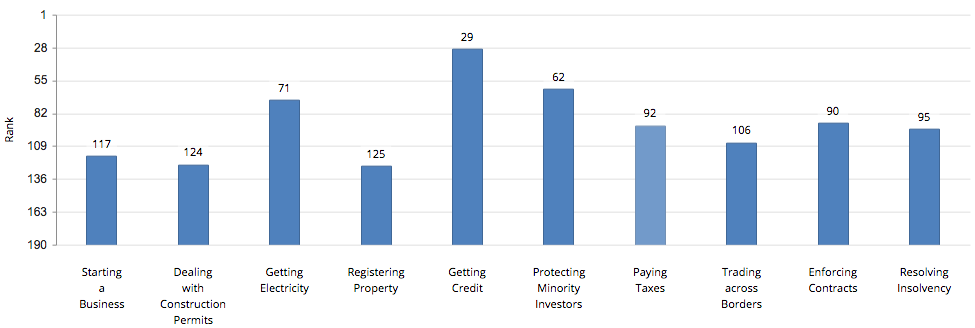
Doing Business: Nigeria 🇳🇬
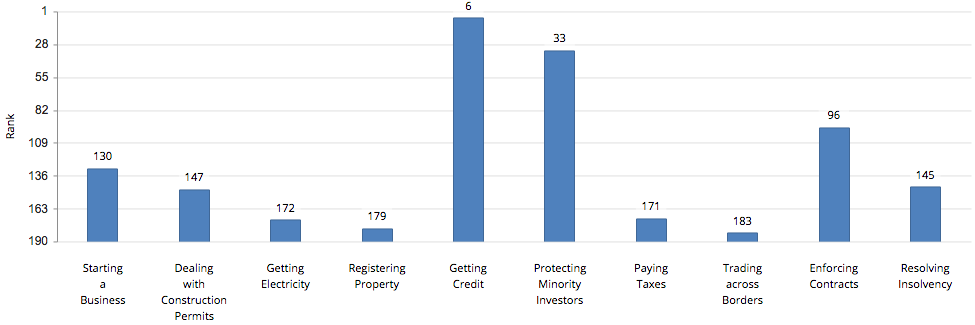
Doing Business: South Africa 🇿🇦
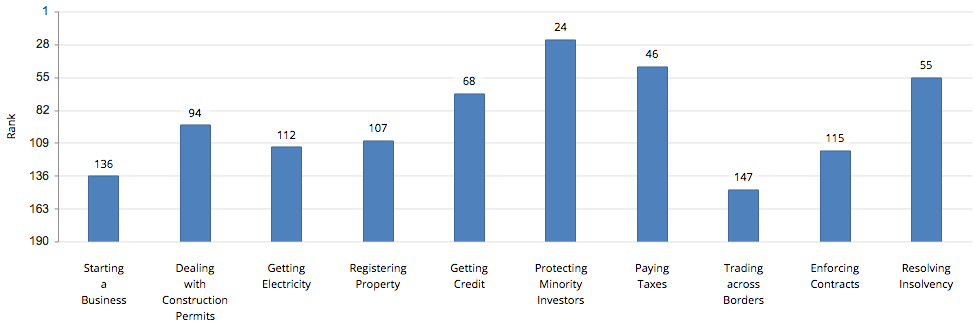
My personal resumée
My motivation to travel to Kenya was to better understand the local environment, culture, tech and startup scene. I literally booked plane tickets and it was not until then when I started to see who I could meet and talk to in Nairobi.
After many positive – and not a single negative – experiences I was able to gain a basic understanding of what it means to run a startup in East Africa through interviews with local stakeholders.
My key take away is that it's simply wrong to imply that East African countries are 'just like Western countries but 15 years behind.' Reality is more complex than that.
With modern technology and an open mindset, problems are solved differently and in most cases more efficiently as well. Africa is moving fast towards a future shaped by entrpreneurs and adventurers who are constantly challenging the status quo.
The impressions of my trip go far beyond this small series of articles. If you want to learn more about Kenya and East Africa or if you have more specific questions, find me on Twitter and get in touch with me!
Special thanks to:
Paul, Sonia, Paul, Elsis, Jérome, Trevor, Sam, Stephen, Anna, Naheed, Mylène, Luna and Eunice for taking the time to answer my sometimes naive questions.